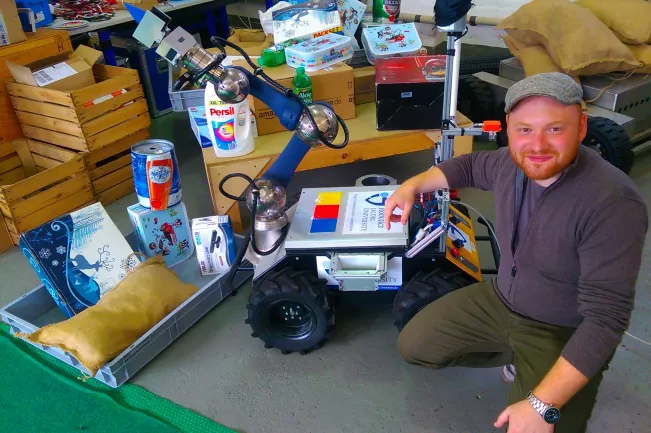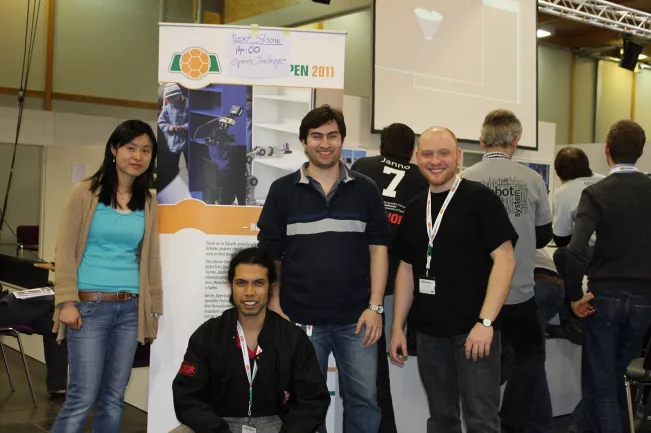Communications and Marketing | Alumni Office

Christian A. Mueller, Autonomous Systems

What is written on your business card?
Christian A. Müller: Research Associate in the Robotics Group at Jacobs University in Bremen. - After my Master's degree, I really wanted to continue my research in the field of robotics - and maybe even do a doctorate. When Jacobs University advertised a doctoral position with its robotics group that exactly matched my interests and expertise, the application, interview and recruitment process went very quickly. I had already started within a few weeks.

What exactly are your tasks today? What is the coolest thing about your job? What's not so great about it?
Christian A. Müller: In Andreas Birk's working group, I mainly research and work on several projects that are funded by the European Union and the Federal Ministry of Education and Research. One is a robotics project in the field of logistics: among other things, we are researching robotic systems that can unload shipping containers autonomously: They have to be able to recognize objects that are to be unloaded (for example coffee bags), grasp them and place them on a conveyor belt. My field of research is problems of visual perception.
Our underwater research is even more exciting and difficult. We want to develop robots that can travel autonomously underwater with a camera and sonar. They should be able to create a kind of underwater map, recognize objects, grab them and bring them to the surface. This is particularly interesting for archaeology, where shipwrecks in the depths of the sea are investigated, for example. But such robots can also be used for the maintenance and repair of underwater machinery. At some point, the technician will no longer have to descend in full diving gear to repair a machine defect.
Here, too, I am concerned with questions of visual perception. Because underwater it is of course much more difficult to recognize and classify objects: Major challenges include adverse conditions such as light refraction in moving water, darkness or so-called "marine snow", i.e. particles floating around such as plankton etc. The field tests are particularly fun, where you can test the developments of recent weeks under real conditions.

What experiences and knowledge from your studies are important or useful for you in your job?
Christian A. Müller : Clearly four things from the Master's program that I owe to my professors Paul Plöger, Gerhard Kraetzschmar, Rainer Herpers and Erwin Prassler:
1. the course on the introduction to academic work. Here we learned how to work scientifically as a real researcher. This clearly went beyond the student level.
2. the professors constantly encouraged and pushed us to write scientific papers. These were papers for international conferences, again well above student level.
3. the technical equipment at the university is of the highest standard. We were able to work with state-of-the-art technology during our studies. I'm just saying: Jenny!
4. the professors kept in close contact with us students. They were actually pretty well informed about our progress. There were also appointment slips on their doors for regular meetings. That helped enormously to get to the heart of our own work.
Were there any strange, funny or sad things during your studies - what would you tell your children?
Christian A. Müller : I took part in several RoboCups, in Graz, Singapore and Istanbul. It was incredibly exciting to work as a team to get the robot ready for the next challenge. I will never forget the good cooperation in our colorful, mixed international RoboCup team. But we students also often met up in our free time after lectures. It was a great time.
Your advice for anyone studying today:
Christian A. Müller:
1. enjoy your time!
2. concentrate fully on your studies and make sure that you really understand the course content. Later on in your job, you won't have the guidance or the time to familiarize yourself with a subject as thoroughly as you did when you were a student.
3. take time to think about which topics you want to work on in your projects, because you will be working on them for a very long time. Focus yourselves.
How would you like to complete this sentence "For me, the Hochschule Bonn-Rhein-Sieg is..."
Christian A. Müller:... a place where my interest in science was awakened and the starting point for a good professional future!